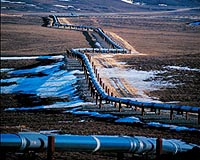 |
Washington DC (SPX) May 12, 2009 While on a net basis the United States imports nearly 60 percent of the oil it consumes, this reliance on imported oil is not by itself a major national security threat, according to a RAND Corporation study. The study finds that the economic costs of a major disruption in global oil supplies - including higher prices for American consumers - pose the greatest risk to the United States. "The fact that the United States imports nearly three-fifths of its oil does not pose a national security threat," said Keith Crane, the study's lead author and senior economist at RAND, a nonprofit research organization. "There is an integrated world oil market, and embargoes do not work. But a large, extended drop in the global supply of oil would trigger a sharp rise in oil prices and significantly affect the United States, no matter how much or how little oil the United States imports." The RAND study evaluates commonly suggested links between oil imports and U.S. national security, and assesses the economic, political and military costs and benefits of potential policies to address threats to U.S. national security associated with imported oil. The work was sponsored by U.S. Institute for 21st Century Energy, an affiliate of the U.S. Chamber of Commerce. As with all of RAND's work, the study's conclusions were reached independently. The report finds that the two most serious threats to U.S. economic security are a large disruption in global oil supplies and higher consumer costs associated with the disruption. Higher oil revenues for "rogue" oil exporters, such as Iran and Venezuela, higher revenues that finance Hamas and Hizballah, and U.S. costs associated with protecting Persian Gulf oil supplies constitute moderate risks. Oil revenues that finance small terrorist groups, competition for oil supplies among other consuming nations and the use of energy exports to coerce or influence other countries in ways detrimental to U.S. interests are considered minimal risks to U.S. national security, according to researchers. The study finds that the United States would benefit from policies that diminish the sensitivity of the U.S. economy to a sudden decline in the supply of oil, whether or not the oil is imported. By reducing demand or increasing competitive alternative energy supplies, the United States would place downward pressure on world oil prices and ease risks to U.S. national security. Researchers recommend four policies that would effectively reduce the costs to U.S. national security of importing oil: + Support well-functioning oil markets and refrain from imposing price controls or rationing during times of severe disruptions in supply. + Initiate a high-level review of prohibitions on exploring and developing new oil fields in restricted areas in order to provide policymakers and stakeholders with up-to-date and unbiased information on both economic benefits and environmental risks from relaxing those restrictions. + Ensure that licensing and permitting procedures and environmental standards for developing and producing oil and oil substitutes are clear, efficient, balanced in addressing both costs and benefits, and are transparent. + Impose an excise tax on oil to increase incentives to drivers and manufacturers to economize on fuel use and soften growth in demand for oil. Share This Article With Planet Earth
Related Links RAND Corporation Powering The World in the 21st Century at Energy-Daily.com
 US-Canadian Shale Could Neutralize Russian Energy Threat
US-Canadian Shale Could Neutralize Russian Energy ThreatHouston TX (SPX) May 12, 2009 Rising shale gas production in the United States and Canada as well as potential natural gas supplies from Iraq could be pivotal in curbing Russia's ability to organize an "energy weapon" against European consumers, according to a new study released by Rice University's Baker Institute for Public Policy. The study, "Russia and the Caspian States and the Global Energy Balance," examines Rus ... read more |
|
| The content herein, unless otherwise known to be public domain, are Copyright 1995-2009 - SpaceDaily. AFP and UPI Wire Stories are copyright Agence France-Presse and United Press International. ESA Portal Reports are copyright European Space Agency. All NASA sourced material is public domain. Additional copyrights may apply in whole or part to other bona fide parties. Advertising does not imply endorsement,agreement or approval of any opinions, statements or information provided by SpaceDaily on any Web page published or hosted by SpaceDaily. Privacy Statement |